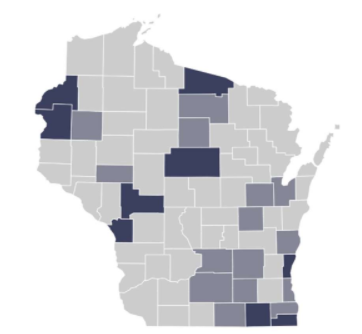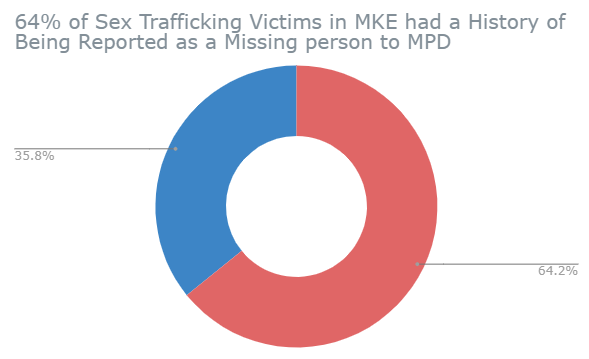Here are the facts about prostitution arrests and trafficking incidents in Wisconsin.
Wisconsin FAQs
The vast majority of human sex trafficking stings in Wisconsin do not rescue victims. Instead, they result in arrests, fines, and criminal prostitution charges brought against adults consensually selling and soliciting sex.
Wisconsin Prostitution Arrest Data
Between 2010-2020, nearly 5,000 people were arrested for the crime of "prostitution and commercialized vice" in Wisconsin.
Between 2010-2019, there were an average of 509 people arrested per year on prostitution charges in the state of Wisconsin. There were 157 arrests in 2020, likely due to the impact of Covid-19 on both workers’ behavior and police practices.
Black and Asian people are greatly overrepresented in prostitution arrests.
Black people accounted for 33% of arrests despite being 6% of Wisconsin’s general population. Asian people accounted for 4% of arrests despite being only 2% of Wisconsin’s general population. These striking disparities reflect racial bias in policing practices and the current carceral response to systemic, racialized poverty, since we know there is no correlation between race and who sells and buys sex. The data also suggests transgender women may be misgendered and undercounted in arrest records.
Most people arrested on prostitution charges are young adults.
The vast majority of people (male or female) who were arrested on prostitution charges were young adults between the ages of 20-39.
Children are being arrested and charged with criminal prostitution charges.
Between 2010-2020, 137 juveniles (children under age 18) were arrested and charged with criminal prostitution. This is despite both federal and state statutes explicitly stating any commercial sex act involving a minor is legally considered sex trafficking.
Prostitution arrests were made in 58 of 72 counties, concentrated in Milwaukee and the Fox Valley.
Seventy-six (76%) of prostitution arrests took place in six counties: Milwaukee, Outagamie, Winnebago, Brown, Dane, and Waukesha. These counties also account for 85% of the total number of Black people arrested for prostitution state-wide.
Wisconsin Human Trafficking Data
Despite the frequency of sensational headlines reporting sex trafficking taking place in Wisconsin, the picture is far from clear.
In 2019, the Wisconsin Department of Justice (WIDOJ) released a report titled the Law Enforcement Assessment of Sex Trafficking in Wisconsin to “gather information about their perceptions, policies, and data entering practices related to human trafficking incidents in their jurisdictions.” The report documents numerous inconsistencies in the ways police agencies across the state understand and report human trafficking cases.
Crucially, the WIDOJ found that 90% of respondent police chiefs and sheriffs “do not have a specific policy for differentiating between human trafficking and prostitution.”
According to the report, because so many law enforcement agencies in Wisconsin incorrectly conflate prostitution (sex work) and sex trafficking, there is not enough adequate data available to understand how much coercion is actually taking place within the sex trade versus how many people are simply being arrested because prostitution is criminalized.
% police agencies who do not have different policies for sex trafficking and prostitution
Law enforcement reporting challenges are not new. Problems persist even though the Wisconsin legislature passed a law in 2013 requiring police departments to identify and disclose human trafficking incidences to the FBI annually, and despite law enforcement being the largest municipal spending category in the state with an aggregate annual budget of $1.3 billion. The Wisconsin DOJ also received millions in federal grants for the specific purpose of combatting sex trafficking.
What We Know
Wisconsin police make approximately five times the number of prostitution arrests than are confirmed incidents of human trafficking each year.
Sex trafficking has been reported in 24 of Wisconsin’s 72 counties.
According to state-wide data that is available, sex trafficking incidences have been reported in 24 counties in Wisconsin since data collection began in 2014 (not all 72 as is erroneously reported by journalists, policymakers, and even judges). In 2018, 73 incidents were reported to the FBI. In 2019, there were 53 sex trafficking offenses that led to arrests in Wisconsin. A separate report looking specifically at Milwaukee incidents found there were an average of 55 victims of sex trafficking identified per year between 2013-2016.
In comparison, according to the WIDOJ, there have been nearly 5,000 arrests for prostitution in Wisconsin over the last decade, meaning Wisconsin police make approximately five times the number of prostitution arrests than are confirmed incidents of human trafficking each year. Marginalized communities, namely BIPOC, LQBTQ+, and poor people, are much more likely to be arrested for prostitution than others. Read more about why this is harmful here.
The best way to combat human trafficking is to address the conditions that make children and adults vulnerable to exploitation, namely poverty.
According to the most recent report on sex trafficking in Milwaukee conducted by the Milwaukee Police Department (MPD) and others, Estimating the Magnitude of Sex Trafficking Risk and Victimization of Juveniles and Young Adults in Milwaukee, there were 187 confirmed victims of sex trafficking in Milwaukee County between 2013-2016. Of the victims:
25% had a history of reported battery or domestic abuse to MPD
15% had a history of reported child abuse to MPD (among juveniles this was 19%)
59% had a reported history of other involvement with MPD for non-sexual and non-violent crimes (i.e. property crimes, robberies, burglaries, car thefts, and welfare checks - known as “crimes of poverty”)
64% of confirmed victims of sex trafficking had a history of being reported as a missing person (a runaway) to MPD at least once
In MKE, 120 out of 187 victims had previously been reported missing at least once.
The report states, “the vast majority of all individuals who were identified as victims of sex trafficking had challenges in their youth, including being reported as a missing person and involvement with the child welfare system. When these challenges are addressed early, rates of victimization may decrease.”
Victims of sex trafficking almost always personally know the predator who takes advantage of their vulnerable situation and traffics them. It is not the case that children are generally at risk of being snatched and sex trafficked. Victims are typically children who live in racialized, state-sanctioned poverty, who’ve endured abuse, neglect, addiction, or who have been rejected by their families due to their sexual orientation or identities.
Laws criminalizing sex workers do nothing to address the underlying cause of sex trafficking. Law enforcement will never be able to sufficiently combat human trafficking until the material conditions in these communities change through equitable public investment and intentional wealth redistribution.
As long as society continues to tolerate the myth that police are the only solution to violence in the sex trade instead of ensuring every family and child’s basic needs are being met, we will continue to see people in the sex trade suffer and exploitation persist in many forms in Wisconsin.
Safe Harbor Legislation
Children deserve care, not criminalization.
Here in Wisconsin, a bipartisan group of lawmakers have taken the first small step towards reducing harm caused by sex work criminalization laws by introducing Safe Harbor legislation which makes it illegal to criminally charge and prosecute a minor under the age of 18 for the act of prostitution.
While this may seem redundant as criminalizing youth engaged in the sex trade directly contradicts state and federal trafficking laws protecting children from exploitation, 83% of chief and sheriffs in Wisconsin have reported their agencies enforce prostitution laws against juveniles. Rights Not Rescue WI supports the effort to pass Safe Harbor legislation as part of a broader movement to decriminalize all sex work in Wisconsin. You can read our official statement here.







